Trifecta: Sergio Leone, Raymond Chandler, Audrey Hepburn (Part 2)
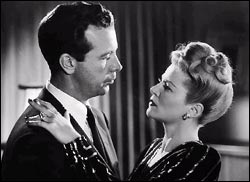 "What are you doing back here?"
"What are you doing back here?""I'm a homing pigeon. I come back to this stinking coop, no matter how late it is."
"Murder, My Sweet"
It's usually unsaid, but the specter of Humphrey Bogart looms large over our public perceptions of Philip Marlowe, private investigator, hard-bitten cynic, hopeless romantic. Thanks to Howard Hawks' "Big Sleep" and Bogart's persona, we have a monolithic vision of Raymond Chandler's detective hero: calm and cocky in any situation, tough enough to disarm the bad guys with a quip and a nasty left hook, amorous enough to trade sexual double entendres or Proust references with Lauren Bacall, adroit enough to dodge a femme fatale's double-cross with a witty rejoinder. "Is he cuter than you?" a would-be seductress purrs at Bogart. His response, delivered deader than deadpan: "Nobody is." Indeed.
But we would do well to remind ourselves -- as this low-key gem from director Edward Dmytryk does -- that Chandler's Marlowe is far from the confident, strutting dream of a private eye that Bogart essayed. In truth, Chandler's Marlowe was a bit of a sad sack, existing from one low-paying job to the next, getting threatened, shaken down by the cops, and beat up on a regular basis. Yet through some cockeyed devotion to truth, justice, and an honest day's living, he would insist on continuing to "hit between end and tackle." Reading Chandler's Marlowe novels today, it's remarkable to see the contrast between Marlowe's dogged search for the truth and the futility of the enterprise -- often the perpetrators are caught, but crime is never prevented, and Marlowe is left a few bucks richer, and a whole lot more pessimistic about the human condition.
Only three films have captured that essential spirit of Marlowe's world. Roman Polanski's "Chinatown" grafts the Marlowe character onto Jack Nicholson's Jake Gittes, and in a cruel twist makes him complicit in the crime he is determined to solve. Robert Altman's "The Long Goodbye" also perpetrates violence on Marlowe by placing him smack dab in the middle of vacuous 1970 LA, where any notion of justice or truth is laughed at in a sunny, drugged-out haze. "Murder, My Sweet" takes a softer approach, fully playing into the genre conventions that dominated crime dramas of the 40s, but not shying away from the essential darkness and unresolvability that embody Chandler.
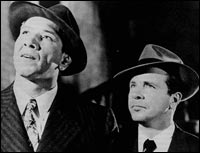 Based loosely on Chandler's "Farewell, My Lovely" (the title was changed for American audiences, presumably to gain the hard-boiled edge common to films of that era, but when one considers that the "lovely" woman of the title is anything but, the film also loses some ironic bite in the title change), the plot is standard labyrinthine Chandler: conniving young wives, snarling cops who may or may not be on the take, comspiracies involving stolen jewelry and drug pushers and blackmail. Trundling through the center of it all is Marlowe, sniffing in all the wrong places, a pain in the neck to everyone, including himself. With memories of Bogart fresh in our heads, Dick Powell's interpretation of Marlowe can be a bit startling. He snaps the requisite one-liners with flair, but there is a softness about him, a faint aura of ridiculousness, that neatly dovetails with Chandler's Marlowe. The guy is no pushover, but he's no superman. Whether getting suckered into a job for a few extra bucks, getting shot up with enough drugs to fly a kite (the "smoke like a web woven by a thousand spiders" sequence where Marlowe fights against his own narcotic haze is a gripping, surreal highlight), playing Mr. Uncooperative with the local coppers, tsk-tsking and arching his eyebrows at the venality of evildoers, or even nearly getting blinded by a close-range gunshot, Powell's Marlowe exists on the small scale, a portrait of the average smart guy thrown into un-average situations, undeniably human.
Based loosely on Chandler's "Farewell, My Lovely" (the title was changed for American audiences, presumably to gain the hard-boiled edge common to films of that era, but when one considers that the "lovely" woman of the title is anything but, the film also loses some ironic bite in the title change), the plot is standard labyrinthine Chandler: conniving young wives, snarling cops who may or may not be on the take, comspiracies involving stolen jewelry and drug pushers and blackmail. Trundling through the center of it all is Marlowe, sniffing in all the wrong places, a pain in the neck to everyone, including himself. With memories of Bogart fresh in our heads, Dick Powell's interpretation of Marlowe can be a bit startling. He snaps the requisite one-liners with flair, but there is a softness about him, a faint aura of ridiculousness, that neatly dovetails with Chandler's Marlowe. The guy is no pushover, but he's no superman. Whether getting suckered into a job for a few extra bucks, getting shot up with enough drugs to fly a kite (the "smoke like a web woven by a thousand spiders" sequence where Marlowe fights against his own narcotic haze is a gripping, surreal highlight), playing Mr. Uncooperative with the local coppers, tsk-tsking and arching his eyebrows at the venality of evildoers, or even nearly getting blinded by a close-range gunshot, Powell's Marlowe exists on the small scale, a portrait of the average smart guy thrown into un-average situations, undeniably human.Likewise, the supporting actors are not so much archetypes as they are twists on standard genre types. Instead of incorporating Marlowe's love interest from the novel, Anne Riordon, the filmmakers have opted to have Marlowe fall for Anne Grayle (played perky and anxious by Anne Shirley), the stepdaughter of the murderous Helen Grayle. With her unusual looks (Marlowe even comments on her crooked nose at one point) and reluctant smiles, Shirley makes for a change from the typical milquetoast "good girl." Claire Trevor dominates her screen time as wicked stepmother Helen, her alarming fleshiness and indolent sexuality putting a fresh spin on the usual slinky femme fatale, although like Shirley, her character tends to be shortchanged in the proceedings. Faring better are the other minor characters: Mike Mazurski is fittingly hulking and befuddled as the tragically lovelorn Moose Malloy, and Otto Kruger plays the unctuous Jules Anthor, drug pusher to millionaires, with maximum disdain.
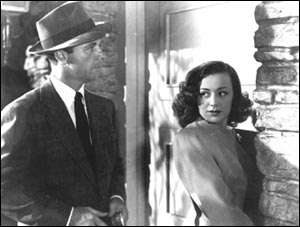 Dmytryk seems either incapable or unwilling to build up to the same rollicking pace that Hawks employed for the "The Big Sleep." Here, the story moves in fits and starts, heading down seeming dead ends, jumping back and connecting plot points, loping along with the same unhurried yet unstoppable rhythm of its protagonist. Along with the aforementioned drug haze sequence, there are expressionistic shadows, ominous overhead shots, jarring close-ups, and even point-of-view depictions of unconsciousness ("A black pool opened up before me. I dived right in"). True to Chandler, the film embraces a fatalistic world view in which bad things happen, even in spite of our hero's machinations. Witness the conclusion, in which Marlowe thinks he has everything wrapped up in a tight little package, only to watch it unravel into two murders within seconds of each other. As a sop to the happy ending crowd, we get a touching, comedic denouement with Marlowe and Ann Grayle literally thrown into each others' arms for a closing clinch, but what lingers is the acrid smell of gunsmoke, that comforting but deadly black pool. It doesn't qualify as "fun" in the same sense that the confident "Big Sleep" does, but "Murder, My Sweet" is a potent reminder of the darkness at the heart of Chandler, a sucker punch with a sweet, sad face.
Dmytryk seems either incapable or unwilling to build up to the same rollicking pace that Hawks employed for the "The Big Sleep." Here, the story moves in fits and starts, heading down seeming dead ends, jumping back and connecting plot points, loping along with the same unhurried yet unstoppable rhythm of its protagonist. Along with the aforementioned drug haze sequence, there are expressionistic shadows, ominous overhead shots, jarring close-ups, and even point-of-view depictions of unconsciousness ("A black pool opened up before me. I dived right in"). True to Chandler, the film embraces a fatalistic world view in which bad things happen, even in spite of our hero's machinations. Witness the conclusion, in which Marlowe thinks he has everything wrapped up in a tight little package, only to watch it unravel into two murders within seconds of each other. As a sop to the happy ending crowd, we get a touching, comedic denouement with Marlowe and Ann Grayle literally thrown into each others' arms for a closing clinch, but what lingers is the acrid smell of gunsmoke, that comforting but deadly black pool. It doesn't qualify as "fun" in the same sense that the confident "Big Sleep" does, but "Murder, My Sweet" is a potent reminder of the darkness at the heart of Chandler, a sucker punch with a sweet, sad face.[Next installment: "How to Steal a Million."]

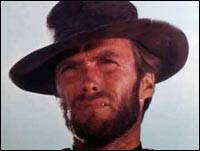 "Is the question indiscreet?"
"Is the question indiscreet?"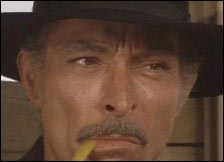 Even more intriguing is how Leone knocks down some of the ultra-tough male conventions he set up in the first film. In "Fistful," Eastwood's nameless protagonist was a force of nature, playing rival families off each other like pawns, remaining above the action even when embroiled in it, seemingly invincible. In "For a Few Dollars More," not only does he have a name (Manco, the only time he is named in the entire trilogy), but far from being all-powerful, he looks downright foolish at times as he fails to match wits with Col. Douglas Mortimer (Lee van Cleef), the experienced Civil War vet who eventually aids him. Yet Mortimer himself cannot be considered the equivalent of the Eastwood character from the first movie, for beneath his collected exterior lurk regret and hidden reasons for vengeance, another trope that will find full expression in Charles Bronson's character in "Once Upon a Time." In a role that is a far cry from the Bad in "The Good, the Bad, and the Ugly," Van Cleef grabs the spotlight, his narrowed gaze suggesting irreconcilable sadness even as his Van Gogh nose and lean body paint a striking picture of coolness under fire. Eastwood, of course, is too charismatic an actor to fade into the background, and as expected, he walks away with the film's best one liners. I won't soon forget his concluding assassination, and punch line: "No problem, old man ... just thought I had a problem with my adding."
Even more intriguing is how Leone knocks down some of the ultra-tough male conventions he set up in the first film. In "Fistful," Eastwood's nameless protagonist was a force of nature, playing rival families off each other like pawns, remaining above the action even when embroiled in it, seemingly invincible. In "For a Few Dollars More," not only does he have a name (Manco, the only time he is named in the entire trilogy), but far from being all-powerful, he looks downright foolish at times as he fails to match wits with Col. Douglas Mortimer (Lee van Cleef), the experienced Civil War vet who eventually aids him. Yet Mortimer himself cannot be considered the equivalent of the Eastwood character from the first movie, for beneath his collected exterior lurk regret and hidden reasons for vengeance, another trope that will find full expression in Charles Bronson's character in "Once Upon a Time." In a role that is a far cry from the Bad in "The Good, the Bad, and the Ugly," Van Cleef grabs the spotlight, his narrowed gaze suggesting irreconcilable sadness even as his Van Gogh nose and lean body paint a striking picture of coolness under fire. Eastwood, of course, is too charismatic an actor to fade into the background, and as expected, he walks away with the film's best one liners. I won't soon forget his concluding assassination, and punch line: "No problem, old man ... just thought I had a problem with my adding."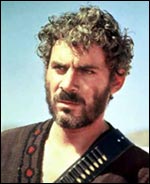 But both Eastwood and Van Cleef play second fiddle to Volonte, whose villainous Indio also breaks the mold. In "Fistful," Volonte was a contained yet flamboyant psychopath, unrivalled in cruelty; here, he has a field day playing a full range of emotions, from self-mockery to calculation to anguish to regret for a woman whose murder he was responsible for. And like Eastwood and Van Cleef, he is also eminently fallible: he spends half the film skulking around in prison rags (he begins the movie incarcerated and disgraced), and later is even taken hostage by one of his own henchman. He is also possessor of the film's most striking element, a musical pocket watch that he plays during his showdowns. Ever the showman, Leone uses the watch no less than three
But both Eastwood and Van Cleef play second fiddle to Volonte, whose villainous Indio also breaks the mold. In "Fistful," Volonte was a contained yet flamboyant psychopath, unrivalled in cruelty; here, he has a field day playing a full range of emotions, from self-mockery to calculation to anguish to regret for a woman whose murder he was responsible for. And like Eastwood and Van Cleef, he is also eminently fallible: he spends half the film skulking around in prison rags (he begins the movie incarcerated and disgraced), and later is even taken hostage by one of his own henchman. He is also possessor of the film's most striking element, a musical pocket watch that he plays during his showdowns. Ever the showman, Leone uses the watch no less than three 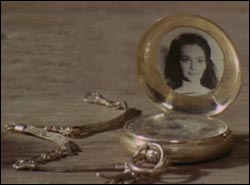 times in the film, and the great Ennio Morricone seamlessly merges the chimes with his score, even as he creates unique sound signatures for his major players (the familiar sliding whistle for Eastwood, a mouth harp for Van Cleef). Yet even with this iconography being bandied about, when we get to the final duel between Indio and Mortimer, you feel the vulnerability of the participants, and even the humanity behind their blood lust.
times in the film, and the great Ennio Morricone seamlessly merges the chimes with his score, even as he creates unique sound signatures for his major players (the familiar sliding whistle for Eastwood, a mouth harp for Van Cleef). Yet even with this iconography being bandied about, when we get to the final duel between Indio and Mortimer, you feel the vulnerability of the participants, and even the humanity behind their blood lust. For the past month, as is sometimes my wont, I have been catching up on a TV show. This in itself is not unusual -- in the Pre-Tivo Era, I was a committed
For the past month, as is sometimes my wont, I have been catching up on a TV show. This in itself is not unusual -- in the Pre-Tivo Era, I was a committed  And so now the merry-go-round has spun to rest on
And so now the merry-go-round has spun to rest on 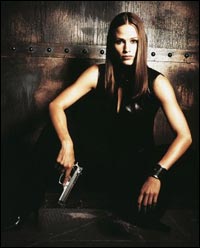 I'll refrain here from a plot synopsis and analysis -- Charles Taylor's
I'll refrain here from a plot synopsis and analysis -- Charles Taylor's 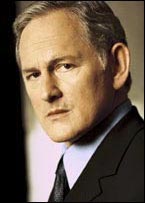 But towering over them all are Victor Garber as Sydney's father Jack Bristow, and Ron Rifkin as her villainous employer Sloane. With his pinched forehead, brusque fatherly instincts, laser stare, and rat-a-tat speech rhythms, Jack Bristow could have degenerated into parody, but Garber is a master of subtlety, and his scenes with Garner, as father and daughter grow closer even as the phantoms of their past threaten to tear them apart, have ache and bite. No weepy moments of confession from Garber, but no blank-faced ice man either -- every purse of his lips or narrowing of his eyes speaks volumes, revealing much without giving away the whole game. With all the huffing and puffing of the outrageous plots, it is Garber's visage, more than anything else, that is the true thrill of
But towering over them all are Victor Garber as Sydney's father Jack Bristow, and Ron Rifkin as her villainous employer Sloane. With his pinched forehead, brusque fatherly instincts, laser stare, and rat-a-tat speech rhythms, Jack Bristow could have degenerated into parody, but Garber is a master of subtlety, and his scenes with Garner, as father and daughter grow closer even as the phantoms of their past threaten to tear them apart, have ache and bite. No weepy moments of confession from Garber, but no blank-faced ice man either -- every purse of his lips or narrowing of his eyes speaks volumes, revealing much without giving away the whole game. With all the huffing and puffing of the outrageous plots, it is Garber's visage, more than anything else, that is the true thrill of  Likewise, Rifkin brings a Shakespearean dimension to his part, even when the script inflates him to super-baddie status. Immacculately dressed, burning with the hurt of past slights that are never quite revealed, small and shrunken yet focused like a spider, Sloane makes for a worthy adversary. And not without sympathy, as he would sooner dismantle the organization he has spent a lifetime serving than let them assassinate his lymphoma-stricken wife. Of course, this frees him up to do even greater mischief, but such are the aims of evil genius. Just as we love a stylish bad guy, we admire Sloane for his twisty strategems, how he seems to be unknown to all but himself, and it is this mystery that is the mirror to Jack Bristow's enigma. We may strain to read Garber's face, but we regard Rifkin's countenance with alarmed suspicion -- one moment he is congratulating an underling with paternal pride, and the next he is ordering his execution. And somehow, both expressions seem genuine. With Jack Bristow, we glimpse the feeling behind the facade; with Sloane, we peel back layers only to find more layers.
Likewise, Rifkin brings a Shakespearean dimension to his part, even when the script inflates him to super-baddie status. Immacculately dressed, burning with the hurt of past slights that are never quite revealed, small and shrunken yet focused like a spider, Sloane makes for a worthy adversary. And not without sympathy, as he would sooner dismantle the organization he has spent a lifetime serving than let them assassinate his lymphoma-stricken wife. Of course, this frees him up to do even greater mischief, but such are the aims of evil genius. Just as we love a stylish bad guy, we admire Sloane for his twisty strategems, how he seems to be unknown to all but himself, and it is this mystery that is the mirror to Jack Bristow's enigma. We may strain to read Garber's face, but we regard Rifkin's countenance with alarmed suspicion -- one moment he is congratulating an underling with paternal pride, and the next he is ordering his execution. And somehow, both expressions seem genuine. With Jack Bristow, we glimpse the feeling behind the facade; with Sloane, we peel back layers only to find more layers.